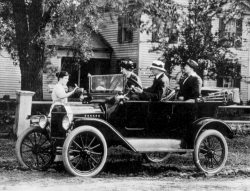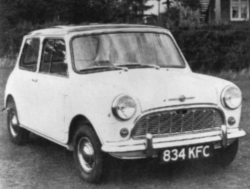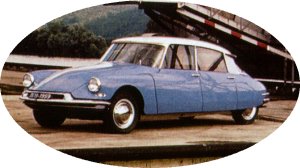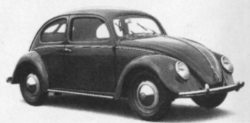|
||||||||||||||||||||||
 |


The winner was the Ford Model T with 742 votes, second was the Mini with 617 votes and third was the CitroŽn DS19 with 567 votes. Runners up were the Porsche 911 and Volkswagen Beetle.
Before discussing the results in detail and explaining why I disagree with the outcome, I will point out that in my opinion, the entire contest was both irrelevant and flawed in both concept and organisation.

Firstly, the contest was organised over the Internet. This immediately skews the results in favour of those countries where Internet access is the greatest (read the USA).
Secondly, voting by the public was set up in such a way as to allow only one vote per e-mail address; thus if you have both a work and private e-mail address, you had two votes.
Thirdly, the e-mail address on the COTC web site did not work so it was not possible to point out these shortcomings.
Fourthly, the picture of the "DS19" was actually a picture of the ID19 (a minor point but indicative of the slipshod approach taken by the organisers).
Fifthly, there was a bulletin board which was clearly not monitored or moderated since a number of people used it to post offensive messages which had little or nothing to do with the contest.
Finally, the criteria for determining the Car Of The Century were ill-defined - should one cast one's votes on the number of vehicles sold (in which case the Toyota Corolla should have been the winner), or technical excellence (the DS), or providing mobility to millions (Ford Model T, VW Beetle) or influence on subsequent cars (Traction, Mini) or even image (Ferrari, Porsche)? Inevitably, this lack of guidelines muddied the waters but despite this, the five shortlisted cars all had merits but many of those not shortlisted did too.

So, allowing for these shortcomings, what did the results prove?
On the grounds that the Ford Model T was the first mass-produced car and that it provided mobility to millions, it probably deserves first place - especially since the majority of voters undoubtedly were Americans. However, on the grounds of ground breaking technological excellence, it falls down. According to former Chrysler president and car enthusiast Robert Lutz, master of ceremonies at the awards in Las Vegas, "It introduced the division of labour assembly line concept, and it made automobiles affordable to the masses,''
According to the judges, the Mini represented the first practical application of front wheel drive. “It was the first car to genuinely make sense out of the front-wheel drive concept because of the space- saving nature of putting the engine east-west.” This is total nonsense. What it did do was package front wheel drive very effectively for a small car. The mid-engine layout used in both the Traction and DS (and incidentally the SM), while not being as effective as a transverse location in terms of space utilisation, offers other benefits in terms of handling and roadholding. The suspension system of the Mini (if such it may be called) was clever but let us not forget the inspiration behind it, viz. the interconnected system fitted to the 2CV. Alec Issigonis is on record as saying that the 2CV provided him with the blueprint. The Mini is also an icon - we are talking about style and image here - and its appeal crossed national and class barriers in a way that few other cars have managed - the VW Beetle being the only other example that springs to mind. The 2CV was essentially a rustic vehicle and although its appeal broadened late in its life, CitroŽn felt it necessary to "sprinkle a little fairy dust on it" and turn it into the Ami and Dyane to make it more acceptable to sophisticated urbanites.

Let us examine why it did not win.

As mentioned above, the majority of voters were undoubtedly American and young to boot (the average age of Internet users is still under thirty). To these people, the DS is little more than an odd European car that featured in "The Day Of The Jackal" and European Art films. Its impact on American sensibilities is therefore pretty well nil. Its impact on car design is subtle and largely unacknowledged. Thus populism takes precedence over design integrity. Several analogies exist - the superior technology of Betamax over VHS or the Apple Mac over the PC were not reflected in sales. Thus in any contest for Video Recorder Of The Century or Computer Of The Century, the superior product would take second place. Nowhere was this more clearly demonstrated than in the Music Of The Millennium competition where the winners tended to be ephemeral pop acts; thereby reflecting the age of most of the voters. It would appear in this particular contest that the Millennium in question started in the Seventeenth century and only really got going in 1995.
I suspect that had there been different categories - like European Car Of The Century and American Car Of The Century and had the modus operandi of vote casting not been restricted to those with Internet access, we may very well have seen a radically different result. Since the automobile has only been around for a couple of decades longer than a century, why did they not make it the Car Of The Millennium contest? That way the real pioneers of automotive design would have been included although whether the outcome would have been any different is a moot point.
Of course any such contest is little more than entertainment for the masses - and therefore we should not be surprised when products with mass appeal win. The superiority of the DS was not reflected in the sales figures and therefore few ever experienced precisely how superior it was.
The fact that the majority of people participating in this contest reckon the Ford Model T and Mini to be more worthy than the DS is largely irrelevant. After all, in the Fifteenth century, the majority of people believed the world to be flat. The fact that the majority believed this to be the case did not make it so.
© Julian Marsh 1999

